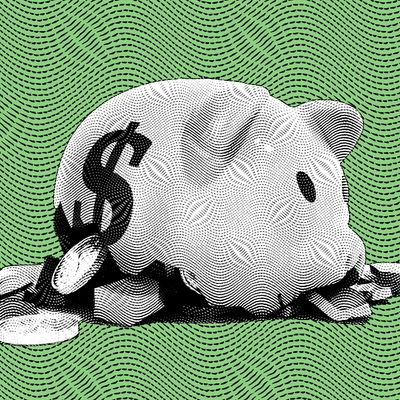
It’s the season for losing money. For anyone keeping money under a mattress, inflation has erased nearly 9 percent of their purchasing power during the last year. Most crypto holders might as well have lit half their cash on fire — and even those are the lucky ones, with two of the largest digital currencies collapsing in a $60 billion implosion over a couple of days. Even Elon Musk, Everyman that he is, isn’t immune to losing $12 billion in a single day. But for most people, the way that they’re getting poorer is the old-fashioned way: through a once-a-decade-or-so stock-market route.
This week is on track to be the seventh in a row that U.S. stock markets close lower, which would be the longest stretch in about 20 years. On Wednesday, the Dow Jones Industrial Average fell more than 1,100 points — bringing the total shrinkage in the U.S. stock market to about $1.5 trillion — and continued to tumble downward on Thursday. In a very real sense, the world is slowing down — so much so that a recession is a very realistic scenario. The pandemic economy, lubricated by some $5 trillion in stimulus and cheap credit, is transitioning into something much more difficult to navigate. Not only are central banks deliberately damming up the flow of money in an attempt to keep prices from rising out of control, the actual shipping and manufacturing of goods — the stuff that that money would buy — is being held back by one shutdown after another in China. There’s also the spike in energy prices thanks, in no small part, to Russia’s invasion of Ukraine and the U.S. and Europe’s subsequent banishing of most things Putin-related from the global financial system. If the degree of interconnection can feel overwhelming, that’s because — well, it is.
This might be the point where you expect some answer as to when this might come to an end. For that, I’m going to disappoint you. The thing is, what’s happening in the world right now is a kind of global reordering, capitalism’s version of pandemic soul-searching. The decade-plus after the 2008 financial crisis was Silicon Valley’s time. Of course, there was Apple, the true giant of the computer world — a company that makes so many things people actually buy that when it discontinues a 22-year-old product, it’s a media event. Then, there were the bajillion Ubers out there, so-called disruptors that lost more money on vague business plans that relied on a fantasy of their benign, venture-capital-subsidized monopoly.
It’s fitting that Apple hit a market capitalization of $3 trillion on January 3, the day the Standard & Poor’s 500 Index hit an all-time high and, with that, began its slow decline into a bear market. Inflation was already a problem then, but Wall Street had recently called it on the pandemic, predicting that the still-novel Omicron variant of COVID-19 would pass through the world as little worse than a bad cold season and everyone would get on with their lives. But now, with inflation not going anywhere and the economy slowing down, the Federal Reserve is on track to raise interest rates to the highest they’ve been since early 2008, and fast. And while that may tip the economy into recession, its more immediate effect is to choke off the easy money that large tech companies rely on to fuel their growth.
In tech’s place has risen an old giant of the economy: energy. The repercussions of Russia’s invasion of Ukraine are likely to keep reverberating for years to come, with the G7 countries — and most of the western world, in general — distancing themselves from Putin’s abundant oil and natural gas. That squeeze has been great for the companies selling non-Russian oil and gas. Although ExxonMobil is worth a paltry $383 billion in market cap — about half of Tesla, even after the electric automaker has been ensnared in its CEO’s Twitter-takeover follow — it’s had a great year so far, with its stock rising more than 40 percent. On May 11, Saudi Aramco replaced Apple as the most valuable company in the world.
These things have compounding effects that can play out in weird ways. Stock indexes, after all, favor the biggest companies — if you invest $500 into the S&P, for instance, it’s not like every company gets $1. So as tech shrinks and oil companies boom, more and more money is going to cycle into your Exxons, Shells, and Chevrons of the world. Investments that try to profit on that kind of movement are set to rearrange their funds, with one $10 billion BlackRock ETF preparing to make a big shift. This kind of rearrangement of capital hasn’t been seen in a long time, and with more and more money likely to chase the few things are in the black, it’s unlikely it could reverse itself anytime soon.






























